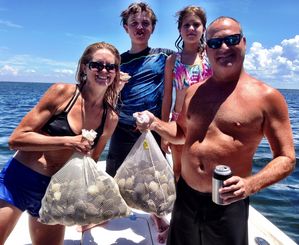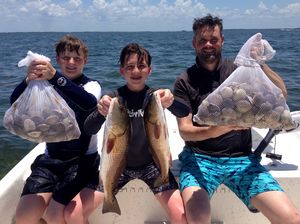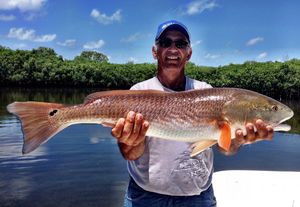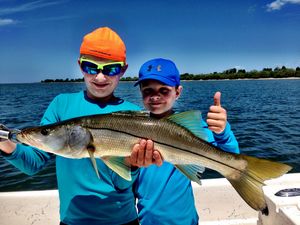July’s beautiful weather and sunny skies have led to perfect fishing and scalloping conditions here along the Nature Coast of Florida. This perfect weather scenario couldn’t have come at a better time either. Here along the Nature Coast our opening week of Scallop Season was truly a historic one with copious amounts of tasty scallops making for very happy snorkelers. This great weather has also had a major impact on our annual Redfish and Snook invasion, which occurs during weather brakes from July-September. Currently all signs are pointing to a record setting Summer with huge numbers of giant Reds being taken on a regular basis during most fishing charters in the Crystal River and Homosassa areas.

Every year from July-September during our strong full and new moon tides the Crystal River area becomes a staging area for millions of glass minnows, scaled sardines and pinfish. When all of this bait/food comes rolling in you can guarantee most swimming predators are aware of this. First you will notice dolphins swarming the local flats, then you will notice a variety of birds diving into these pods, then finally the ever-present Redfish onslaught from below will begin to take place. Within these Redfish feeding frenzies you can also find a smorgasbord of Jack Crevalle, Snook, Snapper, and Speckled Trout. This is an awesome way to fish because everything is so visible. The bait is on the surface and the predator fish feeding on the bait below will often launch themselves out of the water after their intended prey. There is nothing like throwing a spoon or fly threw a feeding frenzy only to watch it disappear in the midst of 100’s of frenzied fish.

After all of this fast paced action is over for the day the plan of choice for most of our visiting anglers is to jump in the water, cool off and enjoy one of the most exciting underwater Easter Egg hunts on the planet. Harvesting bay scallops is easily one of the more effortless yet rewarding water activities found any where in Florida. The equipment needed to harvest scallops is limited to just a mask, snorkel, fins, and a mesh bag.
Most Scallop harvesting is done in crystal clear waters ranging from 2-7ft. Some of the best areas to find scallops are on shallow grass flats, sponge beds, and small coral reefs. The added bonus when covering areas with shallow clear water is that there are tons of other species that one will see while floating along looking for scallops. Crabs, fish, sea horses, dolphins, rays, sponges, and sea turtles are just a few of the many species that one will encounter while searching for scallops.

The most successful method for harvesting scallops is to swim against the current when first looking for scallops and then allow the current to drift you back to your vessel. Best places to look for scallops are on the tops of the long eelgrass, amongst the dark patches of rolling moss (brown floating grass), and on the edges of sponge beds. The key to successful scalloping is to not stir up the bottom once you have located a few scallops. Once you have located your honey-hole slowly float back to the surface and evaluate the surrounding area. Chances are once you have located one scallop, there are probably many more located with in the same vicinity.

